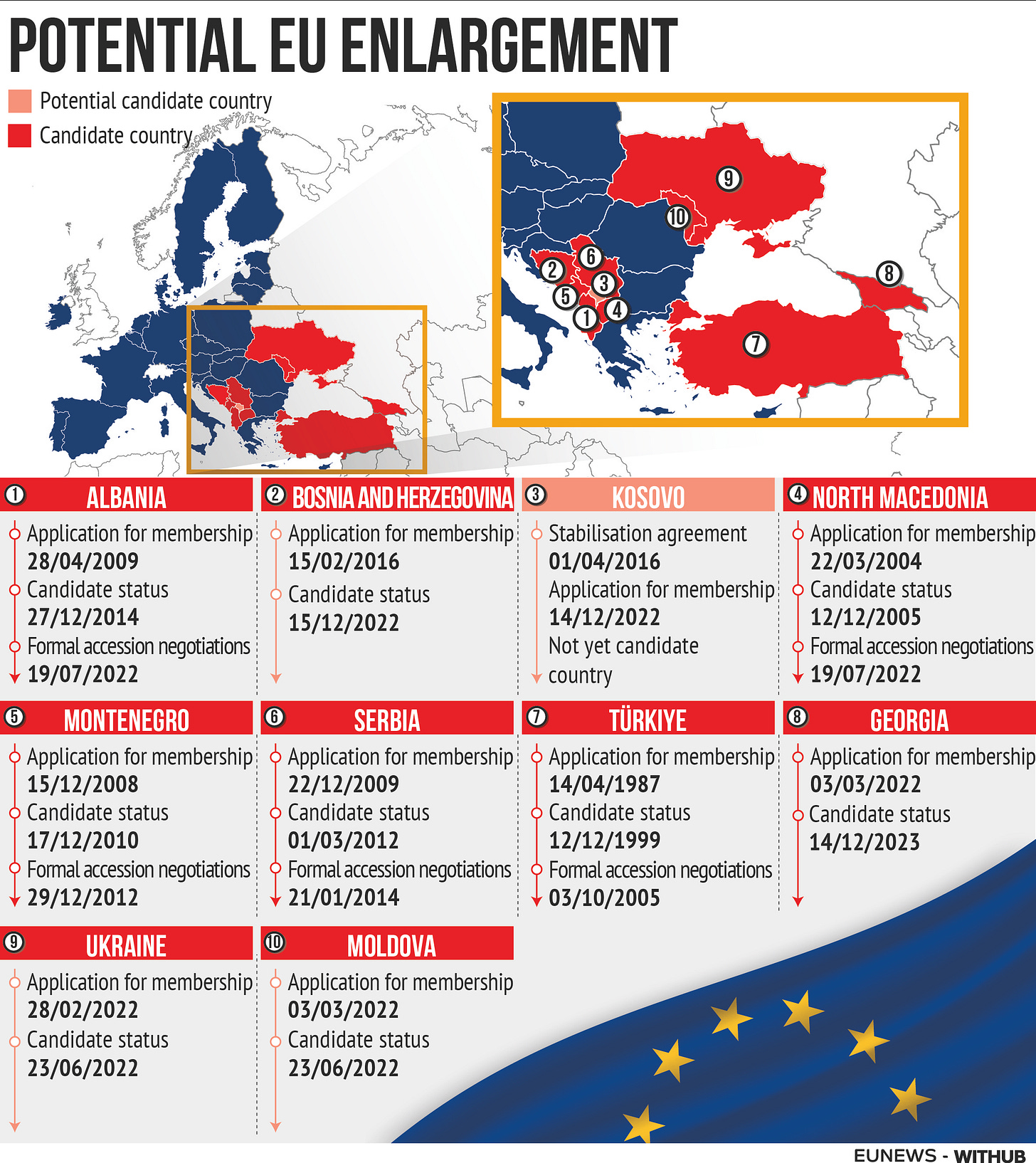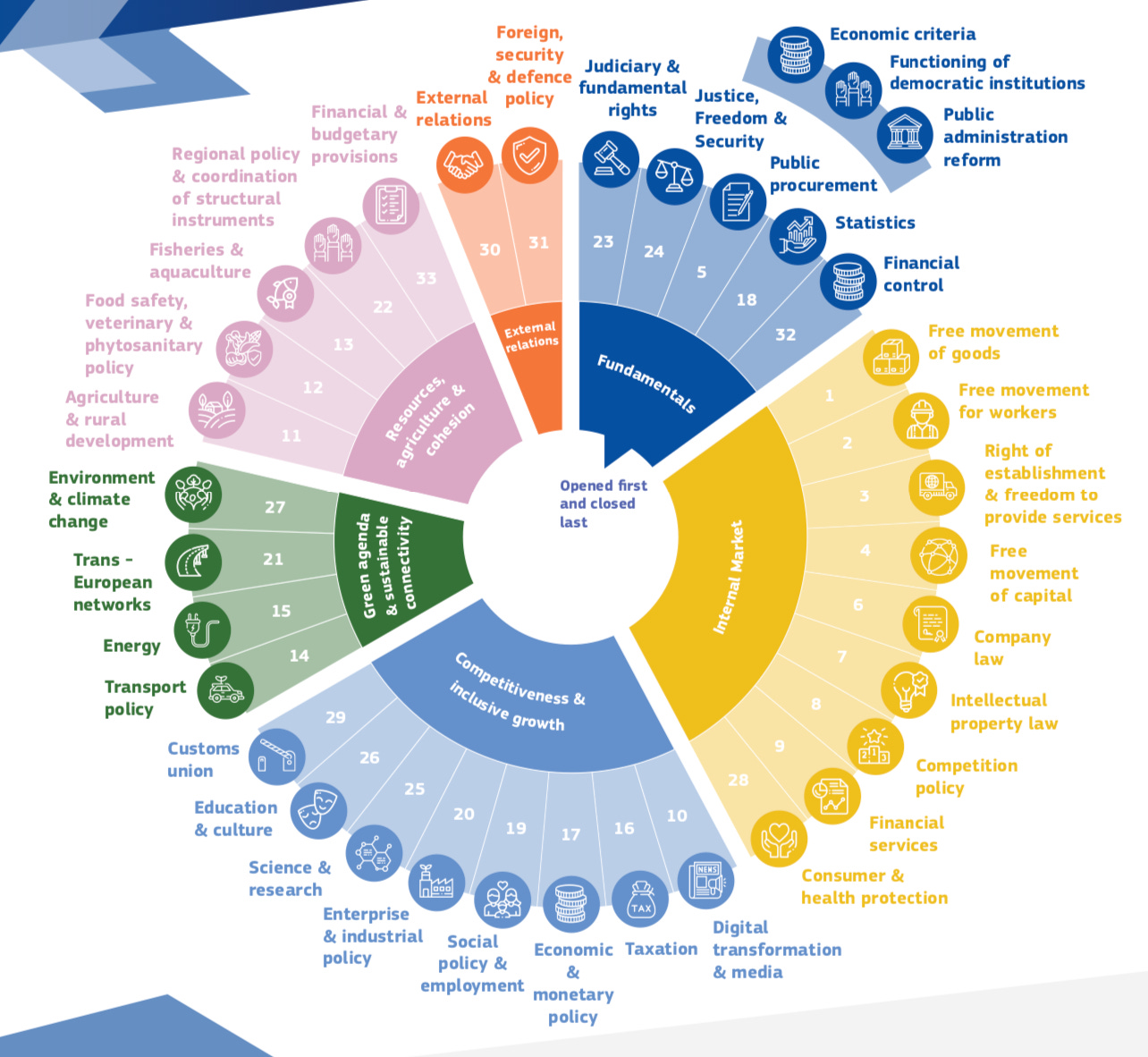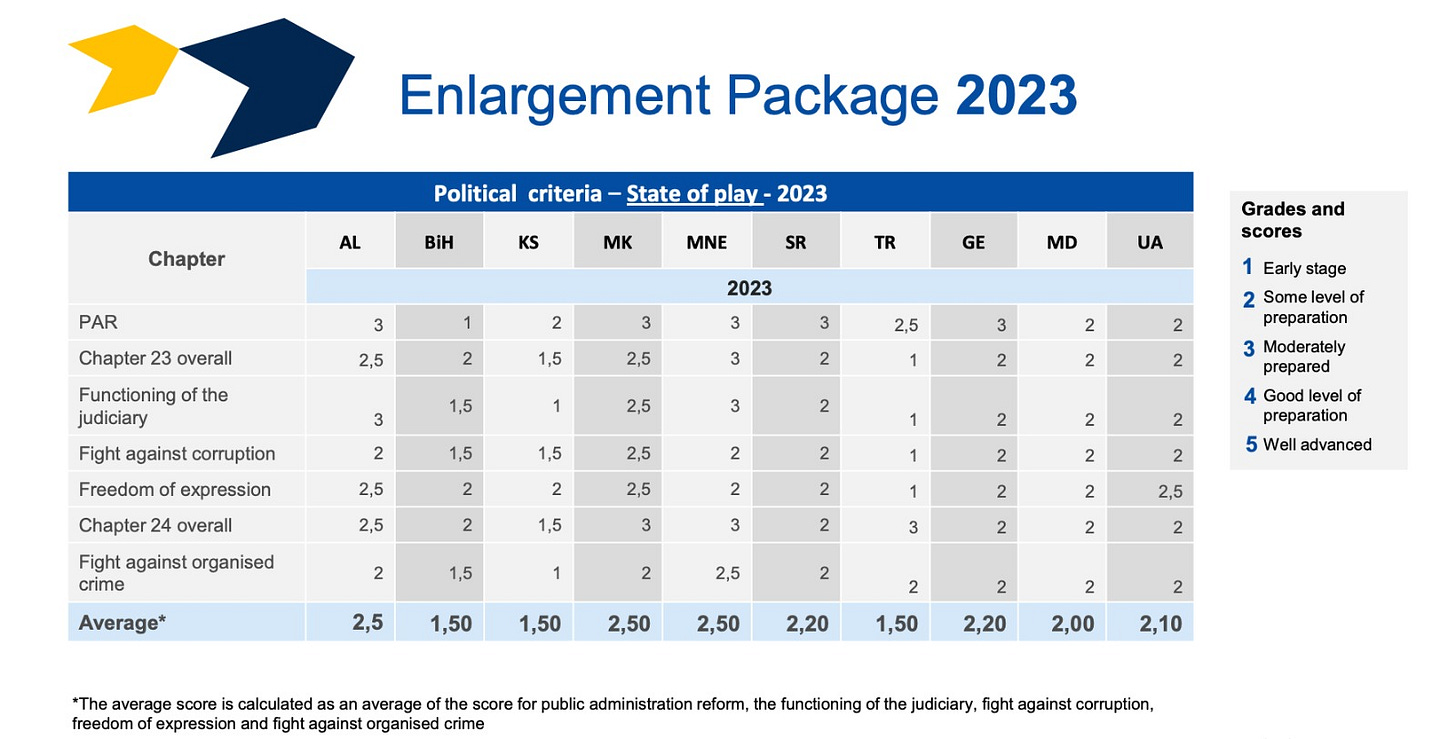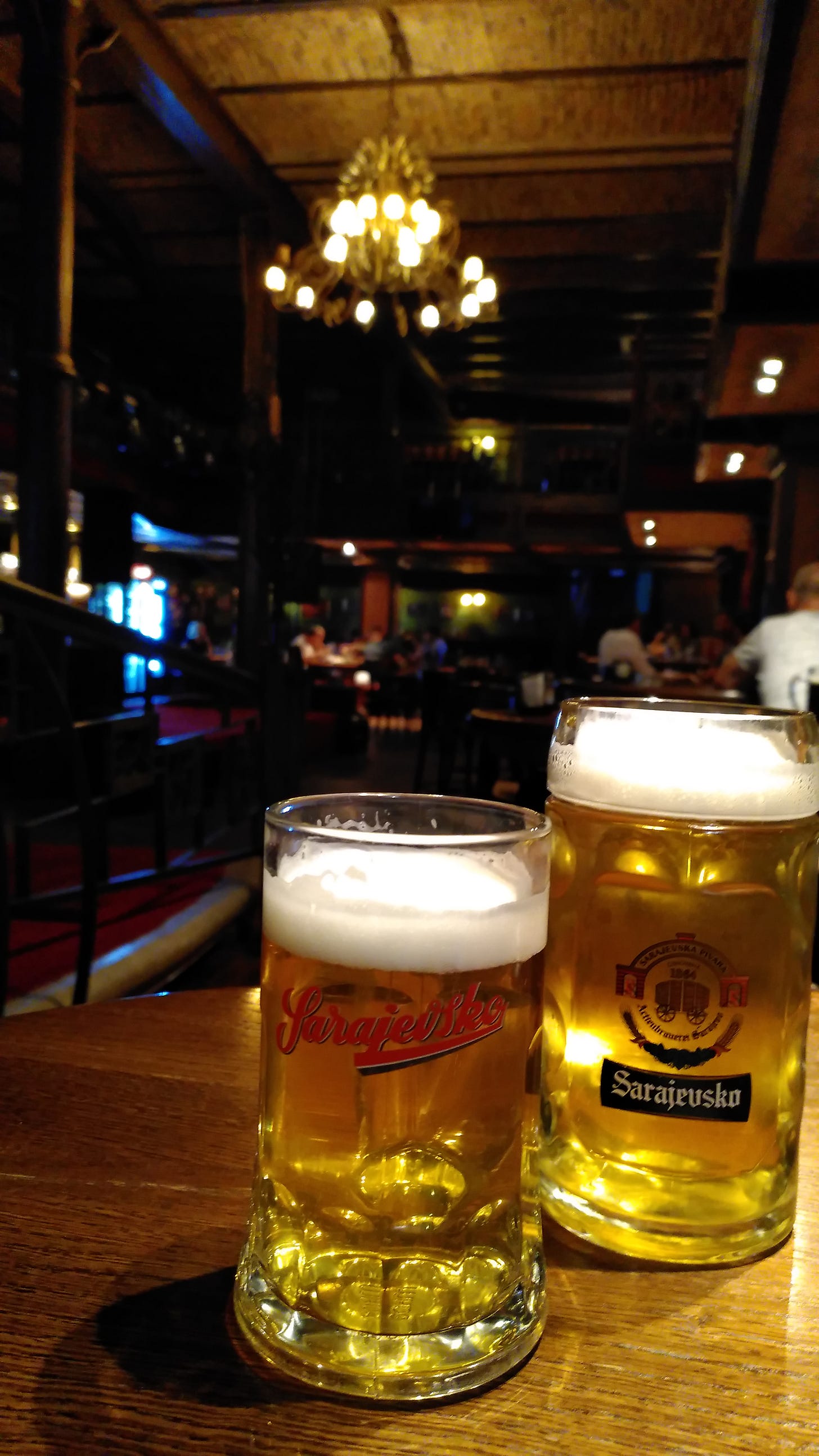S4E9. This is a tipping point
The European Union's decision-making system, taken hostage by the veto right, is revealing all its fragilities on the EU enlargement process in the Western Balkans. As shown by two summits in Brussels
Hi,
welcome back to BarBalkans, the newsletter (and website) with blurred boundaries.
We are witnessing something new on the Western Balkans’ path to join the European Union.
The success of EU enlargement policy has never been linked only to third countries’ readiness to keep their commitments. Lately, it has become more and more clear that it all depends on the mood of those countries that are already part of the Union.
This has always happened, of course. But in the last few days, the entire process has been threatened by the obstruction of a single EU Member State (while some others showed a bit of restlessness).
Today, we will try to explain all this as clearly as possible, reporting what has happened in front and behind the scenes of an event that has become a fixture for BarBalkans.
The EU-Western Balkans Summit in Brussels. It took place on December 13, on the eve of a very complex European Council, whose most crucial point on the agenda was the EU enlargement, precisely.
The awaiting summit
It was certainly not the most exciting EU-Western Balkans Summit in recent years. However, the almost surreal atmosphere that characterized it, made this event almost unforgettable.
The specter of Hungarian Prime Minister, Viktor Orbán, and his veto on accession talks with Ukraine loomed large over discussions on Western Balkans’ future in the European Union.
With serious repercussions for the entire EU enlargement process.
In other words, it became a summit awaiting another summit: the European Council, the collegiate body (informally known as EUCO) that defines the overall political direction and priorities of the European Union, including enlargement.
There were many issues on the EU and WB6 leaders’ agenda on December 13. Economics, energy support, the Belgrade-Pristina dialogue, foreign policy, migration, infrastructures.
The most urgent issue concerned how to «speed up and deliver on the enlargement», including a gradual integration of third countries into the EU decision-making process.
This summit could have been an occasion to discuss the state of relations - after a series of important initiatives over the past year - and to enhance the mutual re-engagement.
On the contrary, everything was like hanging in mid-air, awaiting the fate of the EU enlargement based the Hungarian Prime Minister’s will.
Read also: S2E9. It should be better, it could be worse
Taken hostage
It simply makes no sense to talk about the EU-Western Balkans Summit on December 13 without considering the European Council that took place on the following two days.
The EU enlargement represented the major obstacle at the summit of the 27 EU leaders, as PM Orbán arrived in Brussels with a very tough stance against the accession talks and the financial support for Ukraine.
The accession of Ukraine to the European Union has never been a controversial topic (no objections to granting candidate status were raised in the European Council only a year and a half ago). However, the Hungarian Prime Minister took advantage of the urgency of this issue to blackmail the EU institutions.
Lifting his veto on opening accession talks with Ukraine in exchange for EU frozen funds (due to breaches of the Rule of Law) to Hungary.
The blackmail was successful. It demonstrated all the fragility of a decision-making process still characterized by unanimity and where a single Member State can block any decision thanks to the veto right/power.
Moreover, the Hungarian blackmail triggered a knock-on effect on the EU enlargement process in the Western Balkans.
Read also: Breaking news from Tirana

As EU officials clearly explained before the beginning of the summits, in case Orbán would decide to block Ukraine’s path to the EU, «we still do not know if other Member States will make reasoning on the merit-based process for other candidates as well». They did it.
At the beginning of the EU-Western Balkans Summit - less than 24 hours before the European Council - diplomatic sources explained that Italy decided to link the negotiations talks with Ukraine to negotiations talks with Bosnia and Herzegovina.
In other words, the green light both to Sarajevo and Kiev at the same time. As underlined by other diplomatic sources, this was not an anti-Ukrainian position, but rather an attempt to take the lead of Member States that are pushing on pro-Balkan positions (like Austria and Slovenia).
According to EUCO draft conclusions, the starting position was to «open accession negotiations with Bosnia and Herzegovina, once the necessary degree of compliance with the membership criteria is achieved».
This is in line with the recommendation of the European Commission to the European Council, as stated in the 2023 Enlargement Package. However, Orbán’s obstruction and the threat of other EU leaders risked pushing the process too far down the road of negotiations.
Bosnia and Herzegovina will eventually receive the green light for starting accession talks in the future. «At the latest in March 2024», the European Commission will report «with a view to making a decision», EUCO conclusions point out.
The decision is all political (it will take some time before accession talks formally begin). In any case, we should ask ourselves if the pressure imposed by this EU decision-making system - where blackmails can exist - does not exceed too much Bosnia and Herzegovina’s readiness to the European integration challenge.
Read also: S4E4. Jugeurope
And then, there is another issue that we should not forget, when we consider the veto power in the European Union. PM Orbán’s long shadow also threatens the path of Bosnia and Herzegovina to join the EU.
The major problem for Sarajevo in European integration is represented by Republika Sprska (the Serb-majority entity of Bosnia and Herzegovina) secessionist attempts.
Since 2021, the President of Republika Sprska, Milorad Dodik, has been trying to pull his entity out of the national armed forces, top judiciary body and tax administration. Moreover, in 2023 he passed both amendments to the criminal code reintroducing criminal penalties for defamation and a ‘foreign agent’ law similar to the Russian one.
President Dodik is also the closest European leader to Vladimir Putin. The Russian autocrat was awarded with the Order of the Republika Srpska (the entity’s highest award) and he received the Bosnian-Serb leader twice in Moscow between September 2022 and May 2023.
Considering this foreign policy clearly opposed to the European Union, EU officials reveal that there has been a sanctions framework ready to be approved for some time. However, any concrete measure of this kind requires unanimity in the Council. Hungary has no intention of lifting its veto.
In other words, as long as Orbán «covers his back», Dodik will not be put on the sanctions list. The damage to Bosnia and Herzegovina as a whole - and to the EU enlargement process - will continue to worsen.
Read also: S2E14. Why Bosnia is restless
The state of art
At this point, it is worth to take stock of the progress of the six countries of the Western Balkans on their path to join the European Union.
Starting with Bosnia and Herzegovina, the most talked country following the candidate status granted in December 2022. We still do not know how long it will take for the European Council’s decision on opening accession talks, but only 2 out of 14 pre-conditions have been completed.
The real hope is the fact that candidate status has brought «a much-needed positive dynamic» in the process and the new government «started to implement reforms», the 2023 Enlargement Package states.
Read also: S3E18. What if this is Kosovo’s Golden Year?
Kosovo is now the only country that does not even have candidate status. Following the application in December 2022, the issue is stuck in the Council, as 5 EU Member States do not recognize its sovereignty: Cyprus, Greece, Romania, Spain, and Slovakia.
Optimism stands for «continuing full and voluntary alignment with the EU foreign policy» and for visa liberalization from 1st January 2024. In any case, the path to the EU passes through obligations according to the Belgrade-Pristina dialogue, in particular the creation of the Association of Serb Municipalities.
Serbia started accession negotiations in 2014. However, the major obstacle is the non-alignment with EU foreign policy on sanctions against Russia, as well as the involvement in the escalation of tension in Northern Kosovo.
Considering the accession negotiations, Serbia «has technically met the benchmarks for opening cluster 3» (‘competitiveness and inclusive growth’), but clusters on ‘fundamentals’ (1) and ‘external relations’ (6) are more difficult.
Montenegro started accession negotiations in 2012 and it is the most advanced country on the path to join the EU. Following years of political polarization and institutional instability - that caused a stalemate - the new government and the new presidency are giving new impetus to the process.
The EU institutions expect Montenegro to close chapters 23 and 24 of accession negotiations (‘judiciary and fundamental rights’ and ‘justice, freedom and security’) within the next six months.
Read also: XLIX. The Chinese all-in in Montenegro
Albania and North Macedonia are still proceeding hand in hand. The accession negotiations started in July 2022 and now they are both expected to meet screening requirements to open cluster 1 (‘fundamentals’).
Meanwhile, Albania will have to work on «freedom of expression, minority issues and property rights, fight against corruption and organized crime».
North Macedonia needs to implement numerous reforms, especially the constitutional amendments on minorities in the country. «The European Union is ready to complete the opening phase of the accession negotiations» with Skopje, «as soon as it has implemented its commitment to complete the constitutional changes, in line with its internal procedures», EUCO conclusions clarify.
Read also: S4E7. Can we really trust Edi Rama?
Pit stop. Sittin’ at the BarBalkans
We have reached the end of this piece of road.
During three long days of summit in Brussels, it is common for journalists to be forced to wait for political developments on the future of Europe.
This is why the press room cafeteria is often very crowded. And it is not unusual to make remarkable meetings.
During the EU-Western Balkans Summit, a EU official (of Bosnian origin) confessed what he would drink to our bar, the BarBalkans.
One of the most famous products from Bosnia and Herzegovina, Sarajevsko Pivo. A blonde and light beer - the oldest in Bosnia - produced in Sarajevo since 1864, when the country was an Austro-Hungarian protectorate.
Now that we are talking about the European future, «all the discussions would be easier, if there were a few bottles» at the negotiating table in Brussels, reveals the EU official while drinking a glass of another (Belgian) beer.
Let’s continue BarBalkans journey. We will meet again in two weeks, for the 10th stop of this season.
A big hug and have a good journey!
Your support is essential to realize all that you have read. And even more.
A job well done needs many hours and energy. Also to keep BarBalkans newsletter free for everyone and to make it an increasingly original product, with new ideas, interviews and collaborations.
An independent project like this cannot survive without the support of the readers. For this reason I kindly ask you to consider the possibility of donating:
Every second Wednesday of the month you will receive a monthly article-podcast on the Yugoslav Wars, to find out what was happening in the Balkans - right in that month - 30 years ago.
You can listen to the preview of BarBalkans - Podcast on Spreaker and Spotify.
Pay attention! The first time you will receive the newsletter, it may go to spam, or to “Promotions Tab”, if you use Gmail. Just move it to “Inbox” and, on the top of the e-mail, flag the specific option to receive the next ones there.









